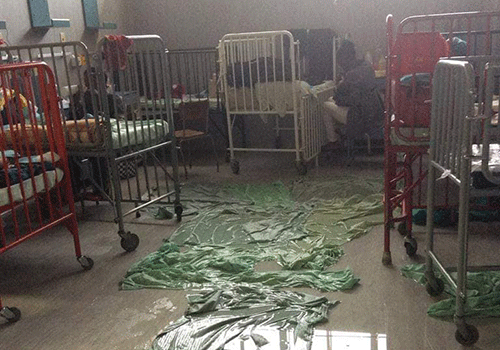Health executive director Ben Nangombe has rejected any assertion that public health is in a “crisis”, saying characterisation is significantly distant from the reality on the ground.
By this stance, Nangombe has effectively dismissed recent findings by the National Assembly’s standing committee on gender equality, social development and family affairs, which highlighted the dire conditions most hospitals and satellite clinics find themselves.
The committee found a health system in tatters.
The recent parliamentary visit has further exacerbated existing criticism of the public health sector, which has been grappling with an avalanche of challenges, ranging from deteriorating facilities, medication and personnel shortages, lack of ambulances and overcrowded facilities – all of which collectively compromise the quality of service delivery.
Despite these issues, Nangombe remains resolute in his resolve that the health system is “operational, robust and effective”. “The ministry has compiled a document, called the Health System Strengthening Financing Document. We have taken the priority of priorities, which covers human resources, equipment, pharmaceuticals, ambulances and various infrastructures,” Nangombe said during an emergency press conference held Sunday.
Nangombe said the ministry is cognizant of the challenges in the sector, but strategies are in place to alleviate the same.
The challenges, he said, will be addressed within five years according to the ministry’s soon-to-be-approved strategy, at an estimated cost of around N$16 billion.
“It [plan] has been submitted to government for consideration, and government is going to communicate on the outcome of that consideration in due course,” he said.
He restated that the issues have already been identified, and the remaining task for the ministry is to gather resources and initiate the implementation process.
The ED also said some challenges afflicting the implementation of capital projects include the non-performance of contractors.
“They are really letting [us] down, unfortunately,” he said.
Cumbersome
He also noted the lengthy process of procurement processes that delay the implementation of the projects.
In the midst of these challenges, Nangombe said the ministry has strengthened the evaluation criteria to ensure only suppliers who have proven their technical capabilities are considered for their work.
More so, during a media induction over the weekend, Central Procurement Board of Namibia (CPBN) chairperson Amon Ngavetene highlighted corruption and irregularities among bidders in the health sector as some of the challenges the Board faces. “Corruption has become a serious issue,” he said. As such, the ministry has resorted to blacklisting or recommending the debarment of service providers who underperform.
“Every contractor who will be debarred will no longer participate in the public procurement system. This is a motivation for contractors to ensure quality, they perform as required and complete projects on time,” Nangombe said in no uncertain terms.
The seasoned administrator added the ministry will also impose penalties on contractors who fail the ministry.
So far, only three companies are listed as debarred on the electronic government procurement portal. Nangombe also said the ministry will conduct thorough assessments of the lowest bids before granting awards.
“When you only look at the lowest bidder, this can lead to lack of capacity or the contractor has tendered themselves too low and therefore they will not be able to acquire the material and expertise,” he said.
Tenders
As per data provided by the ministry, tenders for pharmaceutical and clinical supplies amounting to N$866 million were granted to various companies within a three-year span. These awards encompass pharmaceutical products, valued at N$190 million, and procured clinical items, valued at N$20 million.
These contracts, procured through emergency methods, were granted this year.
In 2021, an open international bid was secured for the supply and delivery of Anti-Retroviral products, amounting to N$184 million. In 2020, a tender included the supply and delivery of pharmaceutical products, valued at N$354 million – and another of clinical products, amounting to N$118 million, were awarded.
Concluded
Nangombe provided an overview of several completed projects, which include the renovation of the Emergency Care Unit at Katutura Hospital, expansion of the Kalkland prefab facility (inclusive of consulting rooms and a waiting area), conversion of a portion of the 96-bed isolation unit at the Katutura Intermediate Hospital into a 15-bed dialysis unit, renovation of the Katima Mulilo Hospital and the construction of an ICU, among various other projects.
In contrast, certain projects have experienced delays.
They include the enhancement of Swakopmund District Hospital and the construction of a neonatal unit, as well as the upgrading of Onandjokwe Hospital, which involves the construction of a new maternity ward.
Additionally, projects in the pipeline included the construction of the Khomas District Hospital and the establishment of ICUs at the Windhoek Central Hospital, as well as the Rundu, Gobabis and Mariental hospitals. – ashikololo@nepc.com.na


